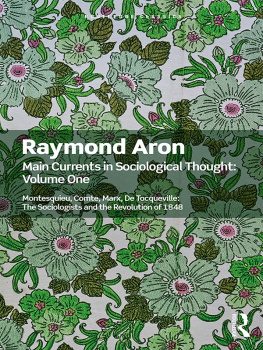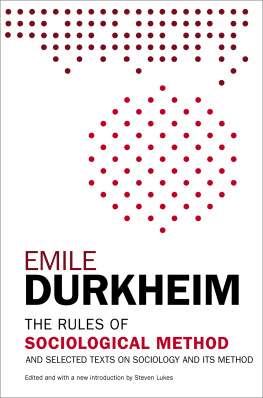Originally published in French by Editions Gallimard, Editions Gallimard, Paris, 1994.
published 1998 by Transaction Publishers
Published 2017 by Routledge
2 Park Square, Milton Park, Abingdon, Oxon 0X14 4RN
711 Third Avenue, New York, NY 10017
Routledge is an imprint of the Taylor and Francis Group, an informa business
Copyright 1998 by Dominique Schnapper.
All rights reserved. No part of this book may be reprinted or reproduced or utilised in any form or by any electronic, mechanical, or other means, now known or hereafter invented, including photocopying and recording, or in any information storage or retrieval system, without permission in writing from the publishers.
Notice:
Product or corporate names may be trademarks or registered trademarks, and are used only for identification and explanation without intent to infringe.
Library of Congress Catalog Number: 97-40882
Library of Congress Cataloging-in-Publication Data
Schnapper, Dominique.
[Communaut des citoyens. English]
Community of citizens : on the modern idea of nationality / Dominique Schnapper ; preface by Daniel Bell ; translated from the French by Sverine Rose.
p. cm.
ISBN 1-56000-351-0 (alk. paper)
1. Nationalism. 2. Nation state. I. Title.
JC311.S2913 1997
320.54dc21
97-40882
CIP
ISBN 13: 978-1-56000-351-9 (hbk)
Daniel Bell
Dominique Schnapper, ne Aron, is one of the leaders of the third generation of French post-World War II sociology.
French sociology before World War II was dominated by the intellectual legacy of mile Durkheim, who died in 1917. The major figures were Maurice Halbwachs, Paul Fauconnet, and Celestin Bougl in sociology, Marcel Mauss (Durkheims nephew) in anthropology, Georges Davy (who was director of the cole Normale Suprieure) in law, and Marcel Granet in Chinese civilization. The famous Annales group, founded by Marc Bloch and Lucien Febvre, showed Durkheims influence in their emphases on mentalits and social structure.
Yet, despite Durkheims work on suicide, little empirical investigation was undertaken in this period. The reasons were varied. There was, in large part, the traditional philosophical distrust of empiricism as wayward and contingent, as against la logique, the underlying structure of knowledge. (As Claude Lvi-Strauss describes the classical method in his Tristes Tropiques: there are two choices; take one.) And there was a paucity of chairs of sociology: one at the Sorbonne occupied by Fauconnet, one at Strasbourg (where Durkheim had taught) occupied by Halbwachs, one at Bordeaux. Research funds were almost nil; only after World War II was sociological research introduced into LEcole Pratique des Hautes tudes (where graduate seminars are held), with the support of the Rockefeller Foundation, and the CNRS.
More important for sociology, however, was the decline of the Durkheim legacy itself. Durkheim had espoused a rational secularism and in his image of the moral order had proposed, in effect, a civil religion identical with the Third Republic and humanism. But in the years of the Depression, of heightened class conflict, the rise and success of fascism and a looming war, the Durkheimian view of society comprising a moral center seemed anachronistic, if not irrelevant.
The first generation of post-World War II sociologistsJean Stoetzal, Georges Friedmann, and Raymond Aronhad been members of Celestin Bougls Centre de Documentation at the cole Normale Suprieureone still needed to be a normalien as the path to teaching positions. Though Bougl had been a Durkheimian, his students rejected the inheritance. Aron, who had gone off to Germany to study, in the early 1930s, became influenced by Max Weber (who had been entirely ignored by Durkheim and never mentioned in his magazine LAnne Sociologique) and brought Weber to France. Friedmann (originally a philosopher and a student of Leibniz) was influenced by Le Play (though that was not acknowledged) and undertook studies of work and the rationalization of work by the machine process. Stoetzel, a social psychologist, became interested in public opinion, polling, and survey research. The three were joined by Georges Gurvitch, a Russian migr who had spent the war years in the United States, and who constructed his own system of phenomenology.
But, again, institutional positions were few. In 1952, the teaching positions in sociology in the faculty of letters were hardly more numerous than in 1910. Davy and Gurvitch held the two chairs at the Sorbonne. Stoetzel taught in Bordeaux. Friedmann had a chair at the Conservatoire National des Arts et Mtiers (originally an evening school for working-men who sought technical training). These men became the patrons for those who desired advancement in sociology and they dominated the juries of the grand examinations, in particular, the doctorat dEtat, the major sign of achievement and recognition. Aron taught part-time at Sciences Po, while concentrating on journalism. Recognition came relatively late in his academic life, first with a chair at the Sorbonne and at cole Pratique des Hautes tudes, and then to a chair at the College de France, the most prestigious institution in French academic life.
Gurvitch had few students. (At the examination of Michel Crozier for the doctorat dEtat, on his book the Bureaucratic Phenomenon-Jhese were celebrated events and were reported in Le MondeGurvitch accused Crozier of subverting French intellectual life with American methods of research, and thus abetting American imperialism. Crozier was defended by Aron). Stoetzel and Friedmann were the patrons of the younger normaliens, Boudon and Touraine. Aron, who stood aside from academic politics was the major intellectual influence, though the Centre de Sociologie Europene, which he headed with support from the Ford Foundation, sponsored the work of Michel Crozier, Jacques Lautmann, and Pierre Bourdieu, who broke with Aron after 1968.
Claude Lvi-Strauss once remarked that sociology was not a discipline with a specific field, but an attitude: therefore one does not need to be a sociologist to do sociology. In the postwar years, in effect, there were two sociologies: the sociology of Saint-Germain des Prs, and the academic sociology that expanded with the growth of research groups.
The sociology of Saint-Germain des Prs had its roots in the existentialism of Jean-Paul Sartre, the Marxism of Louis Althusser, the radical Nietzscheanism of Michel Foucault, the subliminal psychoanalysis of Jacques Lacan, the literary ethnography of Roland Barthes and Edgar Morin (whose patron, initially, was Georges Friedmann), the deconstructionism of Jacques Derrida, the postmodernism of Jean-Franois Lyotard, and the pop sociology (frothing like instant coffee) of Jean Baudrillard. There is an old observation that intellectual fashions, like couture, originate in France and sell in the United States. (I leave aside the structural anthropology of Claude Lvi-Strauss, with his heroic, if overweening, effort to find a rational underlying structure of the human mind which would encompass all levels of social exchange from economics to communication to kinship.)
Sociology as an academic discipline was established by the second generation, and largely by four men who gained international reputationsRaymond Boudon, Pierre Bourdieu, Alain Touraine, and Michel Crozier. To these one can add the late Franois Bourricaud, Georges Balandier, Henri Mendras, Jean-Daniel Reynaud, and Eric de Dampierre.












